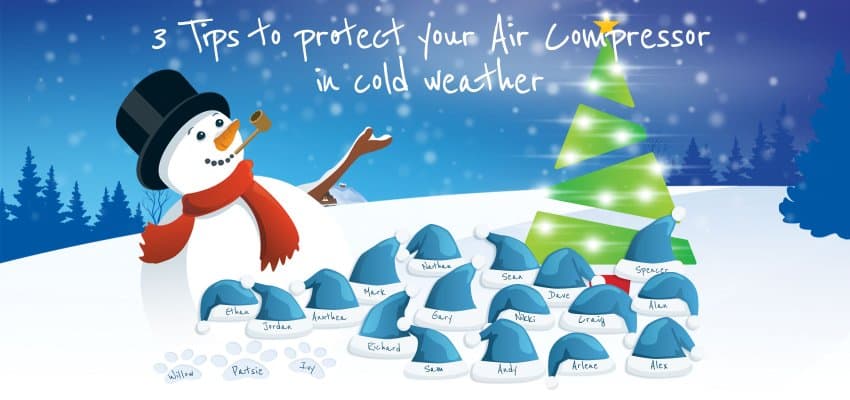Seasons greeting and a gentle reminder to think about your compressor’s maintenance needs this winter.
Get your compressor ready for Winter 2023/24
With a colder, dryer, UK winter predicted by the Met Office – the best gift you can give your compressor, is to apply these three essential maintenance tips. Better still, use your Xmas shutdown for your maintenance overhauls!
Compressors hate cold weather
You can’t control the weather, however if you have a compressor in a remote, unheated location – or worse still, outside of your building – there are some simple steps you can take to ensure a trouble-free winter air supply.
1 – Regularly drain the condensate from your compressor system
One of your compressors biggest enemies is moisture. Condensate tends to collect at low points within the compressed air system. These include the compressor, separators, receivers, filters and dryers, as well as in low points in the compressed air pipework. If temperatures fall low enough this condensate will freeze, blocking pipes or voids within the compressor, dryers, filters, and pipework. If there is frozen condensate in the pipework, this can get blown to the downstream causing damage to the equipment the compressed air system services.
2 – Fit heating inside your compressor room
If you want to ensure your facility continues to function as it should during the winter, it’s vital to protect your industrial air compressor from extreme seasonal temperatures. You can use an ambient heater, to ensure the temperature is just above the minimum to safeguard the compressor from wear on the motor and lower the possibility of system failure.
You might not have as many issues if you run your system around the clock, versus operating it only on weekdays. Operating only on weekdays could lead to problems on Monday morning if the temperature drops over the weekend and the system isn’t running to create its own heat.
3 – Make sure your compressor has been regularly serviced
Whilst you can always take advantage of our 24/7 call out service, it’s more cost effective – and less stressful – to prepare your system in advance. Time spent checking potential issues could save you trouble later, and if you want some expert advice, contact the Cambs Compressor team and we’ll be happy to schedule in a winter service and check-up. The service will cover all your compressed air and associated equipment.
Call us for peace of mind and get your compressor prepared for winter professionally
If you’re running compressed air equipment when the ambient temperature drops below 5C, you should be carrying out the simple checks suggested. This should prevent expensive and unnecessary repair bills and avoidable interruptions to your production. If you have any concerns, it's probably more cost effective and less risky, to have a professional engineer carry out your winter maintenance review. The engineer will provide you with a quick checklist and show you what you can do to mitigate the impact low temperatures have on your system.
12 essential winter maintenance tasks for air compressors:
1 – Cold Weather Lubrication:
Use lubricants suitable for low temperatures. Cold weather can affect the viscosity of lubricants, so ensure that the compressor is filled with the correct oil to maintain proper lubrication in colder conditions.
2 – Oil Inspection and Change:
Regularly inspect the oil level and condition. If needed, change the oil according to the manufacturer's recommendations. Ensure that the oil is suitable for the expected winter temperatures.
3 – Air Intake System Inspection:
Inspect and clean the air intake system, including filters. Cold weather can increase the risk of ice formation, so make sure the intake system is free from obstructions and ice build-up.
4 – Condensate Drain Maintenance:
Check and maintain the condensate drains regularly. Remove any accumulated water to prevent freezing, which could damage the drain valves or blockages in the air system.
5 – Heating Devices:
Consider using heating devices, such as electric heaters or heat exchangers, to prevent moisture in the air from freezing within the compressor. This helps avoid damage to internal components.
6 – Insulation:
Insulate the compressor and associated piping to minimise heat loss. This is particularly important for outdoor installations or areas where the temperature can drop significantly.
7 – Ventilation:
Ensure proper ventilation to prevent overheating. While the primary concern is often preventing freezing, it's essential to balance this with preventing the compressor from overheating during operation.
8 – Belt Inspection:
Check the condition and tension of belts. Cold weather can affect belt flexibility, so adjustments may be necessary to prevent slipping and ensure proper operation.
9 – Control Panel Protection:
Protect the control panel and electrical components from exposure to moisture and extreme cold. Consider using insulated covers or enclosures to shield these sensitive parts.
10 – Regular Start-ups:
Conduct regular start-ups, even if the compressor is not in continuous use during the winter. This helps prevent components from seizing and ensures that the system is ready for operation when needed.
11 – Emergency Shutdown Procedures:
Establish clear emergency shutdown procedures in case of extreme cold weather conditions or unexpected issues. This can help prevent damage and ensure the safety of the compressor and associated equipment.
12 – Monitoring and Alarms:
Implement a monitoring system with alarms to alert operators of any irregularities or issues, such as low oil levels, high temperatures, or pressure drops. This enables timely responses to potential problems.
If your air compressor is likely to experience temperatures below 5°C why not schedule a professional inspection before the winter season?
Our experienced technicians can perform a comprehensive check of the compressor, identifying and addressing any potential issues.



